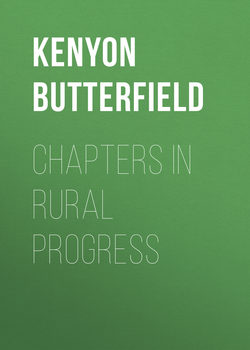Chapters in Rural Progress

Реклама. ООО «ЛитРес», ИНН: 7719571260.
Оглавление
Butterfield Kenyon Leech. Chapters in Rural Progress
PREFACE
INTRODUCTION
CHAPTER I. THE STUDY OF RURAL LIFE
CHAPTER II. THE PROBLEMS OF PROGRESS1
THE OUTLOOK
CHAPTER III. THE EXPANSION OF FARM LIFE
CHAPTER IV. THE NEW FARMER
CHAPTER V. CULTURE FROM THE CORN LOT2
THE AGENCIES OF PROGRESS
CHAPTER VI. EDUCATION FOR THE FARMER
CHAPTER VII. FARMERS' INSTITUTES
CHAPTER VIII. THE HESPERIA MOVEMENT
CHAPTER IX. THE RURAL SCHOOL AND THE COMMUNITY
CHAPTER X. THE GRANGE
CHAPTER XI. OPPORTUNITIES FOR FARM WOMEN
CHAPTER XII. THE COUNTRY CHURCH AND PROGRESS
CHAPTER XIII. A SUMMARY OF RECENT PROGRESS
FORWARD STEPS
CHAPTER XIV. THE SOCIAL SIDE OF THE FARM QUESTION
CHAPTER XV. THE NEEDS OF NEW ENGLAND AGRICULTURE
CHAPTER XVI. AN UNTILLED FIELD IN AMERICAN EDUCATION
CHAPTER XVII. FEDERATION FOR RURAL PROGRESS
Отрывок из книги
The American farm problem, particularly its sociological aspect, has not as yet had the attention that it deserves from students. Much less have the questions that concern rural social advancement found the popular mind; in truth, the general city public has not been deeply interested in the farmer.
But there seem to be recent indications that the sentiment is changing. The heated discussions in New England about Mr. Hartt's interesting clinic over a decadent hill-town, the suggestive fast-day proclamation of Governor Rollins of New Hampshire a few years ago, the marvelous development of agricultural education, the renewed study of the rural school, the widespread and growing delight in country life, have all aroused an interest in and presage a new attention to rural conditions. This is well. The sociologist can hardly afford to omit the rural classes from the scope of his study, especially if he desires to investigate the practical phases of his subject. Moreover, no one with intelligent notions of affairs should be ignorant of the forces that control rural life.
.....
The farming class, if at all ambitious for group influence, can hardly avoid this tendency to organization. Farmers, indeed more than any other class, need to organize. Their isolation makes thorough organization especially imperative. And the argument for co-operation gains force from the fact that relatively the agricultural population is declining. In the old days farmers ruled because of mere mass. That is no longer possible. The naïve statement that "farmers must organize because other classes are organizing" is really good social philosophy.
In the group competition just referred to there is a tendency for class interests to be put above general social welfare. This is a danger to be avoided in organization, not an argument against it. So the farmers' organization should be guarded, at this point, by adherence to the principle that organization must not only develop class power, but must be so directed as to permit the farmers to lend the full strength of their class to general social progress.
.....